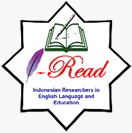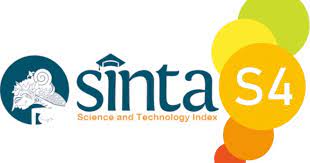The effectiveness of using Wattpad to teach narrative text writing
DOI:
https://doi.org/10.22219/englie.v5i1.31236Keywords:
Narrative Text, Pre-Experimental, Teaching Media, Wattpad, Writing SkillAbstract
This study aimed to examine the effectiveness of Wattpad as a medium to teach narrative text writing to the tenth-grade students of SMK Negeri 5 Pontianak. This study was carried out using a pre-experimental study with one group pre and post-test design. The sample of this research was a cluster involving 30 students from Class X Tata Kecantikan I taken from a population of 334 students. The results indicated that the t-test was 12.489. The analysis of the pre-post-test scores indicated that the pre-test was lower than the post-test (71.5<88.3). The t-test analysis showed a greater value compared with the t-table (12.489>2.045) with the degree of freedom 29 and ???? = 0.05. The analysis revealed that the null hypothesis was rejected while the alternative hypothesis is accepted. In addition, the effect size was categorized as a strong effect with the value (2.28>1.00). Therefore, the research referred that the use of Wattpad as a medium to teach students narrative text writing was effective with a strong effect. Despite its initial purpose, Wattpad can be a recommended media to teach tenth-grade students.
Downloads
References
Adiningtyas, C. N. (2020). The effectiveness of using Wattpad to improve students’ writing skill in vocational high school. RETAIN, 8(4), 170–177.
Agustina, D., & Hidayat, R. (2023). Wattpad ’s role in motivating secondary school students to write a narrative text: A case study. Jurnal Ilmiah Pendidikan, 4(3), 1164–1178. https://doi.org/10.51276/edu.v4i3.472
Ahmadi, D. M. R. (2018). The use of technology in English language learning: A literature review. International Journal of Research in English Education, 3(2), 115–125. https://doi.org/10.29252/ijree.3.2.115
An-Nisa, N., Astika, G. A., & Suwartono, T. (2021). Millennials, technology, and English language teaching. Tarling: Journal of Language Education, 5(1). https://doi.org/10.24090/tarling.v5i1.4072
Astria, A., Mujiyanto, J., & Rukmini, D. (2019). The realization of deixis in students' writing at Sekolah Tinggi Keguruan dan Ilmu Pendidikan Muhammadiyah Pringsewu Lampung. English Education Journal, 9(4), 517–526. https://doi.org/10.15294/eej.v9i4.32170
Bold, M. R. (2018). The return of the social author: Negotiating authority and influence on Wattpad. Convergence, 24(2). https://doi.org/10.1177/1354856516654459
Clark, E., Ji, Y., & Smith, N. A. (2018). Neural text generation in stories using entity representations as context. In M. Walker, H. Ji, & A. Stent (Eds.), Proceedings of the 2018 Conference of the North American Chapter of the Association for Computational Linguistics: Human Language Technologies, Volume 1 (Long Papers) (pp. 2250–2260). Association for Computational Linguistics. https://doi.org/10.18653/v1/N18-1204
Cohen, L., Manion, L., & Morrison, K. (2007). Research methods in education. In Taylor and Francis e-Library (6th ed.). Routledge. https://doi.org/10.4324/9780203029053
Cohen, L., Manion, L., & Morrison, K. (2018). Research methods in education (Eighth). Routledge.
Creswell, J. W. (2012). Educational research: Planning, conducting, and evaluating (4th ed.). Pearson.
Creswell, J. W. (2018). Research design: Qualitative, quantitative, and mixed-methods approaches (5th ed.). SAGE Publications.
Falihah, N., Rahmawati, E., & Baihaqi, A. (2022). EFL Students’ Difficulties in Writing Narrative Text. Journal of English Language Teaching and Cultural Studies, 5(1), 77–90. https://doi.org/10.48181/jelts.v5i1.15026
Faqih, R.N., Munir, M., Anam, S. (2022). The use of Wattpad as media in language learning strategy: Teacher and student perspective of writing performance. Journal of English Teaching, 8(3), 355–365.
Graham, S. (2019). Changing how writing is taught. Review of Research in Education, 43(1), 277–303. https://doi.org/10.3102/0091732X18821125
Heaton, J. B., & Harmer, J. (1988). Writing English language tests: A practical guide for teachers of english as a second or foreign language. Longman Group UK.
Hu, X., Chiu, M. M., Leung, W. M. V., & Yelland, N. (2021). Technology integration for young children during COVID-19: Towards future online teaching. British Journal of Educational Technology, 52(4). https://doi.org/10.1111/bjet.13106
Hyland, K. (2003). Second language writing. In J. C. Richards (Ed.), Cambridge University Press. https://doi.org/10.2307/3588251
Hyland, K. (2021). Teaching and Researching Writing. In Teaching and Researching Writing. https://doi.org/10.4324/9781003198451
Khakimova, L., Lapasova, M., & Lapasova, Z. (2022). The use of innovative learning methods in high educational establishments as a stage of implementation of improving the quality of the educational process. Общество и Инновации, 3(1/S). https://doi.org/10.47689/2181-1415-vol3-iss1/s-pp121-125
Koilara, M., Tambunan, S. F., Hutabarat, R. D., & Tarigan, N. S. (2020). Students’ difficulties in writing narrative text. English Journal of Indragiri, 4(1), 157–167.
Lubis, I. E. W., & Nurjanah. (2020). The effect of Wattpad social media as online reading media on increasing interest in reading fiction in adolescents in Indonesia. Jurnal Online Mahasiswa, 7, 1–12.
Martin, W. E., & Bridgmon, K. D. (2012). Quantitative and statistical research methods from hypothesis to results. In Journal of Chemical Information and Modeling.
Martina, F., Syafryadin, S., Rakhmanina, L., & Juwita, S. (2020). The effect of time constraint on student reading comprehension test performance in narrative text. Journal of Languages and Language Teaching, 8(3), 323. https://doi.org/10.33394/jollt.v8i3.2625
Otta, B. M. I., Arvianti, I., & Heriyanto, E. (2022). Cohesion and Coherence in Students’ Thesis Abstract Writing. Philosophica: Jurnal Bahasa, Sastra, Dan Budaya, 5(2). https://doi.org/10.35473/po.v5i2.1939
Pardede, P. (2011). Using short stories to teach language skills. JET (Journal of English Teaching), 1(1), 14–27.
Purba, R. (2018). Improving the Achievement on Writing Narrative Text through Discussion Starter Story Technique. Advances in Language and Literary Studies, 9(1), 27–30. https://doi.org/10.7575/aiac.alls.v.9n.1p.27
Putri, D. A. (2022). The influence of using wattpad application toward students’ writing ability in first semester of tenth grade of sma negeri 15.
Rerung, M. K. S.T. (2021). The Influence Of Social Media In Learning English For Hospitality And Tourism Students. Journal FAME: Journal Food and Beverage, Product and Services, Accomodation Industry, Entertainment Services, 4(1). https://doi.org/10.30813/fame.v4i1.2798
Rismayani, R., & Basikin. (2020). Improving students’ writing and critical thinking skills through creative writing by using Wattpad. In Teacher Education and Professional Development in Industry 4.0. https://doi.org/10.1201/9781003035978-56
Scott, D., & Morrison, M. (2007). Key ideas in educational research. In Choice Reviews Online, 45(1). https://doi.org/10.5860/choice.45-0409
Setiyawan, A. (2020). Improving Grammar Mastery through Movie Segment for the Fourth Semester of English Students academic year 2018/2019 at Madura Islamic University. Lingual: Journal of Language and Culture, 8(2). https://doi.org/10.24843/ljlc.2019.v08.i02.p06
Suhaeni, N. (2023). The effectiveness of using Wattpad to improve students’ writing skills and critical thinking skills: A phenomenological approach. JLLANS, 1, 16–19.
Trang, N. M. (2022). Using YouTube Videos to Enhance Learner Autonomy in Writing: A Qualitative Research Design. Theory and Practice in Language Studies, 12(1), 36–45. https://doi.org/10.17507/tpls.1201.05
Wardhani, N. A., Mufaridah, F., & Werdiningsih, I. (2019). The effect of using Wattpad on students’ writing ability. Universitas Muhammadiyah Jember, 1510231007, 1–10.
Yusuf, Q., Yusuf, Y. Q., Erdiana, N., & Pratama, A. R. (2018). Engaging with Edmodo to teach english writing of narrative texts to Eflstudents. Problems of Education in the 21st Century, 76(3), 333–349. https://doi.org/10.33225/pec/18.76.333
Downloads
Published
How to Cite
Issue
Section
License
Copyright (c) 2024 Gustiani, et al.

This work is licensed under a Creative Commons Attribution-ShareAlike 4.0 International License.
Authors who publish with English Learning Innovation (englie) agree to the following terms:
- For all articles published in English Learning Innovation (englie), copyright is retained by the authors. Authors give permission to the publisher to announce the work with conditions. When the manuscript is accepted for publication, the authors agree to automatic transfer of the publishing right to the publisher.
- Authors retain copyright and grant the journal right of first publication with the work simultaneously licensed under a Creative Commons Attribution-ShareAlike 4.0 International License that allows others to share the work with an acknowledgement of the work's authorship and initial publication in this journal.
- Authors are able to enter into separate, additional contractual arrangements for the non-exclusive distribution of the journal's published version of the work (e.g., post it to an institutional repository or publish it in a book), with an acknowledgment of its initial publication in this journal.
- Authors are permitted and encouraged to post their work online (e.g., in institutional repositories or on their website) prior to and during the submission process, as it can lead to productive exchanges, as well as earlier and greater citation of published work (See The Effect of Open Access).
This work is licensed under a Creative Commons Attribution-ShareAlike 4.0 International License.
















1.png)












